Academic Exchange in Uganda
The China-Africa Institute (CAI) delegation, led by Professor Wang Xiaoming, Vice President of the CAI, visited Uganda for academic exchange from July 2 to July 7, 2024, and hosted the 20th China Lecture: "Fine Traditional Culture and Modernization: China and Africa".
The lecture was held on July 3, 2024 in Silver Springs Hotel in Kampala, Uganda. It was presided over by Daniel Balongoofu, Research Fellow at Development Watch Centre (DWC) of Uganda, with Ugandan Parliament Member (PM), Dan Atwijukire Kimosho attending. The lecture was addressed by Allawi Ssemanda, Executive Director and Senior Research fellow of DWC; Peter Muramir, Deputy Director of the Business Development Center at Uganda Investment Authority (UIA); Vincent Musubire, Deputy Principal Private Secretary to the Vice President of Uganda, and also Director External Relations at China-Africa Friendship Association of Uganda (CAFAU).
The Ugandan scholars extended a warm welcome to the CAI delegation, and believes that the 20th China Lecture will help promote people-to-people exchange between Uganda and China, support each other in exploring their own modernization, and contribute to a closer Uganda-China friendship and common development.
The event drew more than 50 participants, including experts and scholars from the Development Watch Centre (DWC) of Uganda, Makerere University, African Rural University (ARU), Ndejje University (NDU), Mbarara University of Science and Technology (MUST), Islamic University of Uganda, Uganda Christian University (UCU), Uganda Bioscience Research and Training Centre (UBRTC), Sino-Uganda Research Centre (URC) and other institutions.
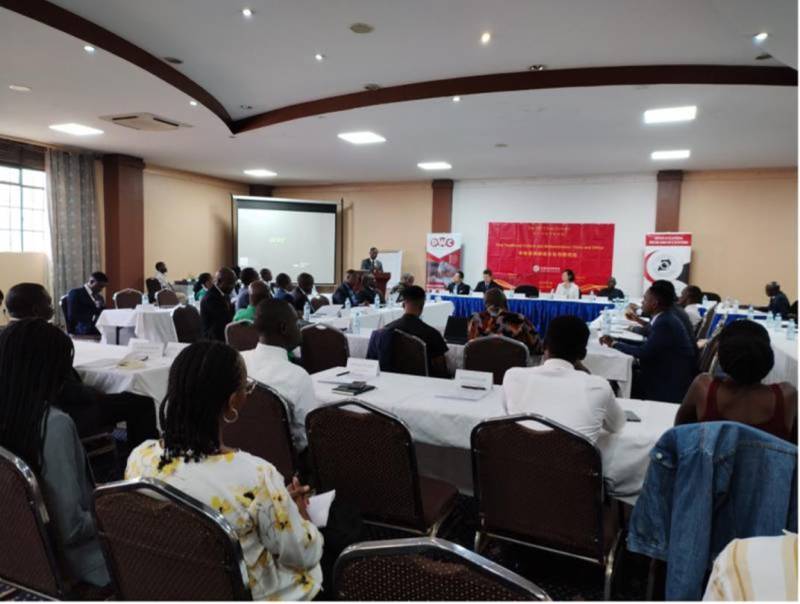
Participants at the 20th China Lecture
Prof. Wang Xiaoming, Wang Jian, Li Wengang, and Shen Xiaolei, delivered keynote speeches respectively. In her speech titled “Cultural Comparison and Mutual Learning from a Cross-cultural Perspective”, Prof. Wang Xiaoming first explained the idea of nature of culture, culture dimensions, high context and low context theory, and the relation between language, culture and communication, highlighting the importance of cultural comparison and mutual learning from a cross-cultural perspective. By sharing case studies of African students in China, multinational corporations and China-Africa people-to-people exchanges, she underlined the cultural homogenization between China and Africa, particularly Uganda. She pointed out that the purpose of mutual learning among civilizations is to respect cultural diversity, to carry forward the traditional culture of the nation while learning from others, so as to promote cultural modernization. The African scholars had a heated discussion with Prof. Wang Xiaoming on issues such as Traditional Chinese Medicine (TCM), African Traditional Medicine, family values and educational philosophy.
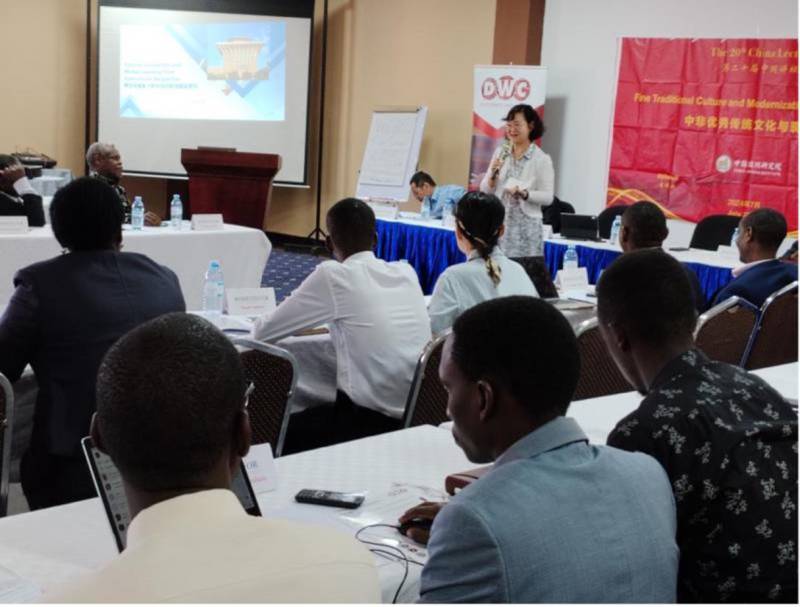
Prof. Wang Xiaoming is delivering a speech
Prof. Wang Jian focused his speech on "Inheritance, Innovation, Development: Promoting the Modernization of China and Africa through Mutual Learning among Civilizations". He explained, the first keyword “inheritance” has two meanings. First, both China and Africa should inherit and carry on their own fine traditional culture, because it is the foundation for exploring the paths to modernization. It also means that Africa and China should carry on their traditional friendship, continue to support each other and join hands to explore paths to modernization. The second keyword “innovation” also has two meanings. First, China and Africa should commit themselves to innovation on the basis of carrying on fine traditional culture. Second, innovation is the key for China-Africa cooperation, and it will further vitalize China-Africa friendship. Finally, the purpose of "development" is to improve people’s well-being and build a more prosperous country. Development can not be achieved without inheritance and innovation. Both China and Africa are making efforts to explore their own paths to modernization and to achieve development goals, this has contributed to the progress of humanity, and will add to the diversity of world civilizations.
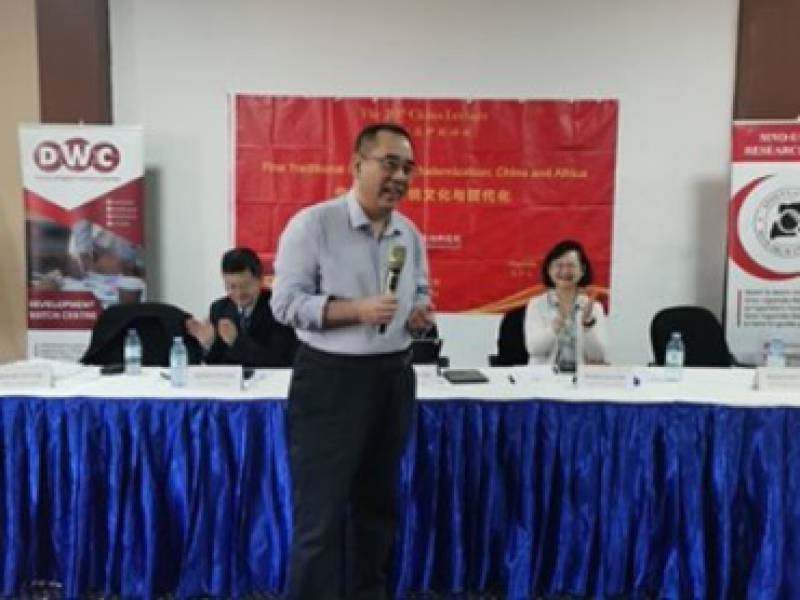
Wang Jian is delivering a speech
Prof. Li Wengang delivered a speech titled “Fine Traditional Chinese Culture and Chinese Modernization”, highlighting that traditional Chinese culture is our valuable asset that evolved over the past thousands of years. It is rich in philosophical thoughts, and emphasizes on the concept of benevolence, righteousness, propriety, wisdom and trustworthiness. Traditional Chinese culture attaches importance to moral values, literature, art, history, customs, education, social system, science and technology, and the idea of harmony. He believes that the fine traditional Chinese culture is not only the prop of our nation, but also constitutes to the diversity of world culture. Chinese modernization is characterized by features that are unique to the Chinese context: It is the modernization of a huge population; It is the modernization of common prosperity for all; It is the modernization of material and cultural-ethical advancement; It is the modernization of harmony between humanity and nature; It is the modernization of peaceful development. These distinctive characteristics represent the profound traditional culture of China, which provides ideological basis, cultural support, as well as wisdom and solutions for Chinese modernization. Inheriting and developing fine traditional culture is also essential for shaping modern Chinese civilization.
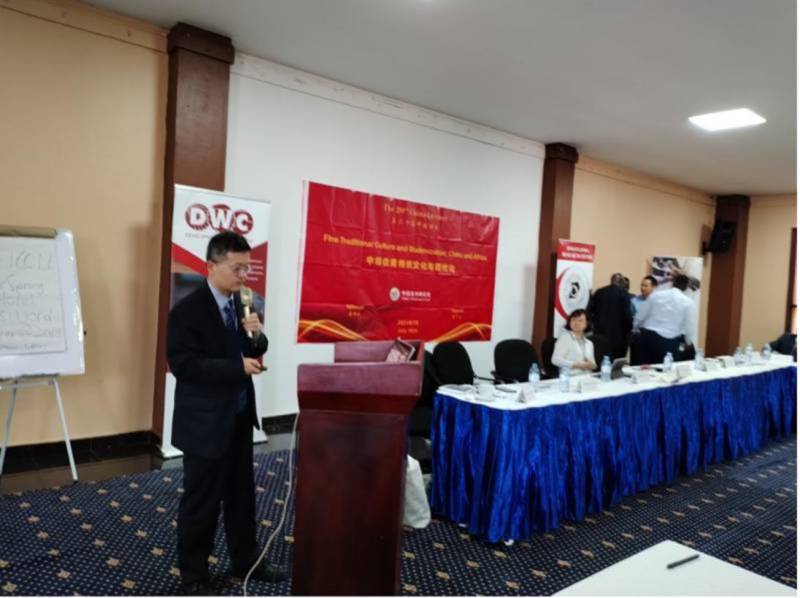
Li Wengang is delivering a speech
In his speech titled "Fine Traditional African Culture and African Modernization", Prof. Shen Xiaolei pointed out that modernization is a historical process with dynamic development, and it may be influenced by politics, economic, culture, resource, international relations and geographical factors of the country. Therefore, each country should pursue their own paths of modernization, instead of simply following other countries. Africa's splendid history developed its rich and diverse traditional culture, and the African philosophy of Ubuntu, Pan-Africanism and other traditional values play a crucial role in African modernization. African countries should adhere to their own paths of development, fully draw the essence of fine traditional African culture while learning from other countries’ experiences. In this way, they will eventually embark on an independent path to modernization that features sound development in politics, economic and people’s livelihood.
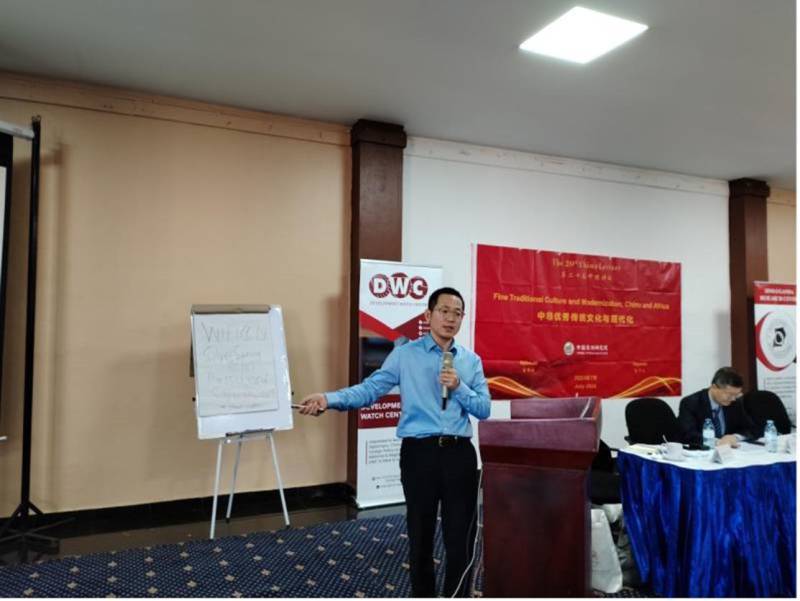
Shen Xiaolei is delivering a speech
A number of African scholars made comments on Uganda-China cultural exchanges, cooperation in healthcare, traditional medicine, education, Chinese investment in Uganda, and the inspiration of Chinese modernization for Uganda. The speakers included Mwehonge Kenneth, the advocacy & networking officer at Coalition for Health Promotion and Social Development; Mwalimu Musheshe, Vice-Chancellor of African Rural University (ARU); Professor Makazibwe Primrose from Mbarara University of Science and Technology (MUST); DWC senior research fellow Ndamaje Francis, Aziz Kalisa and Makazibwe Primrose; and Ssemambo Rashid, Managing Partner at Kalenge, Ssemambo & Co. Advocates. Moreover, John Bosco Ssejemba, the Administration Manager of Uganda National Roads Authority (UNRA) made concluding remark. He said that the lecture will help promote Uganda-China cultural exchanges and mutual learning of modernization paths, and expressed his expectations for enhancing communication and cooperation with the CAI in the future.
The Ugandan scholars, officials and university students displayed great interest in fine traditional Chinese culture and Chinese modernization. They engaged in discussions with Chinese scholars on issues such as TCM and African traditional medicine, family values, educational philosophy, Chinese language learning and the inspirations of Chinese modernization for Africa.
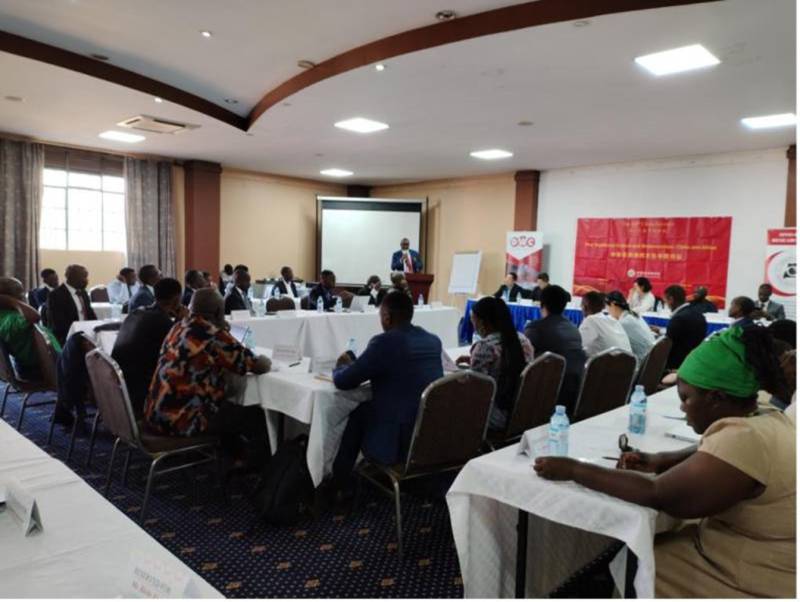
Participants at the lecture
Following the lecture, the delegation paid a visit to the Chinese Embassy in Uganda, and held a meeting with Fan Xuecheng, the Minister Counsellor of the Chinese Embassy in Uganda. Counsellor Fan Xuecheng briefed on the political, security, diplomatic development of Uganda and the China-Uganda relations, and exchanged ideas with the delegation members on issues related to China-Uganda people-to-people exchanges and modernization development. Zhang Zhuo, Director of the Office of Political Affairs, and Zhang Shixue, Attaché of the Chinese Embassy in Uganda, attended the meeting.
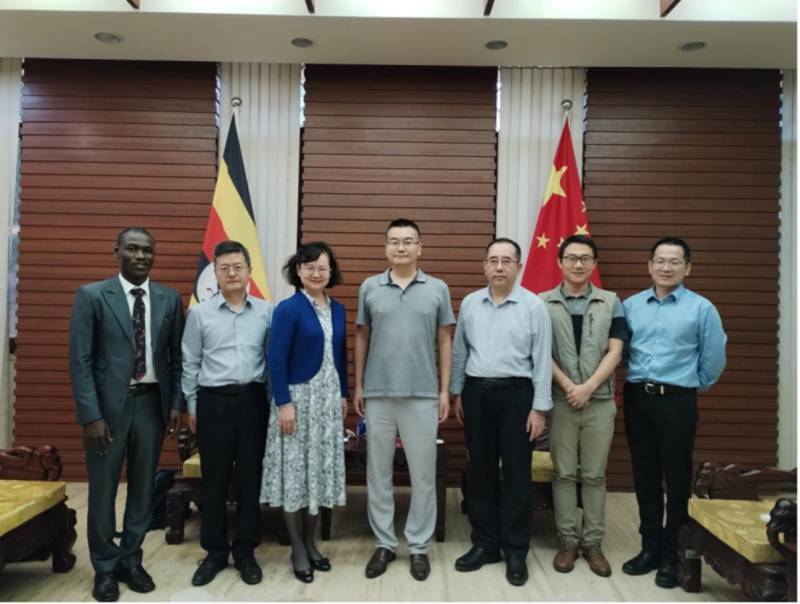
Group photo (Middle: Counsellor Fan Xuecheng; the 2nd right: Zhang Zhuo; the 1st left: Allawi Ssemanda)
At the invitation of Ugandan PM Dan Atwijukire Kimosho and Rosemary Nyakikongoro, the delegation visited Kazo District and Sheema District which are about 400 kilometers from Kampala. In Kazo District, the delegation was warmly welcomed by the District Chairperson Samuel Mugisha, and had discussions with local Non-Governmental Organization (NGO) officers on poverty alleviation. In Sheema District, the delegation hosted a seminar in Sheema Women Development Forum (SWODEF), sharing China's experiences in poverty alleviation, the role of women's education in poverty alleviation, and poverty alleviation in Xizang Autonomous Region of China. PM Rosemary Nyakikongoro addressed the seminar, expressing her gratitude to the delegation for visiting the district and communicating with local grassroots officials. Pulikeria Muhindo, Sheema Resident District Commissioner, also made remarks. More than 50 people attended the seminar.
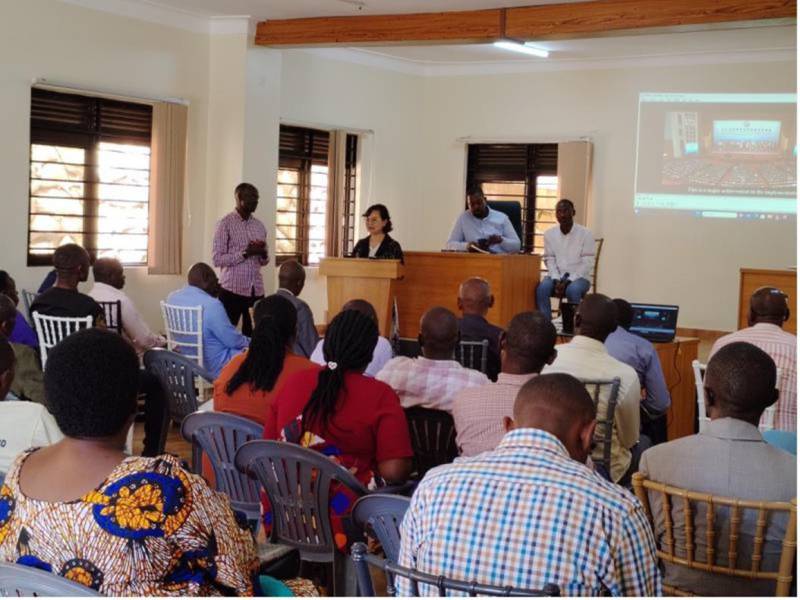
The CAI delegation is communicating with local officers in Kazo District
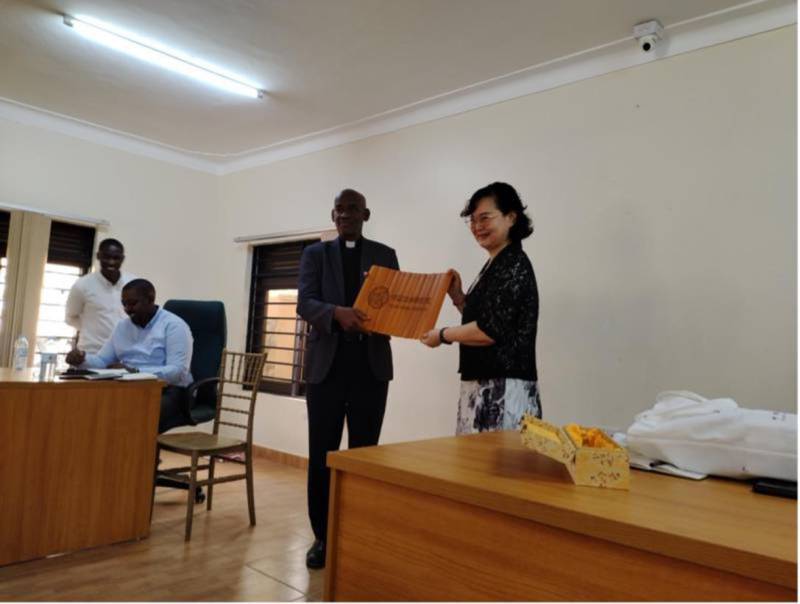
Prof. Wang Xiaoming is presenting a bamboo slip as a gift to Samuel Mugisha
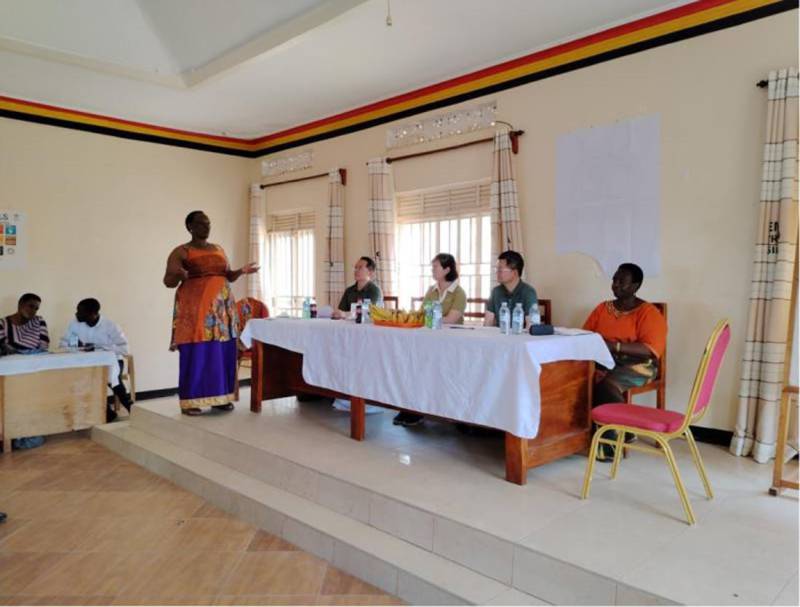
PM Rosemary Nyakikongoro is delivering speech in Sheema District (The 1st right: Pulikeria Muhindo)
The delegation also paid a visit to the Confucius Institute at Makerere University, the Uganda Development Observatory Center (DWC), China National Offshore Oil Corporation (CNOOC) Uganda, and the National Curriculum Development Center of the Ugandan Ministry of Education (NCDC).
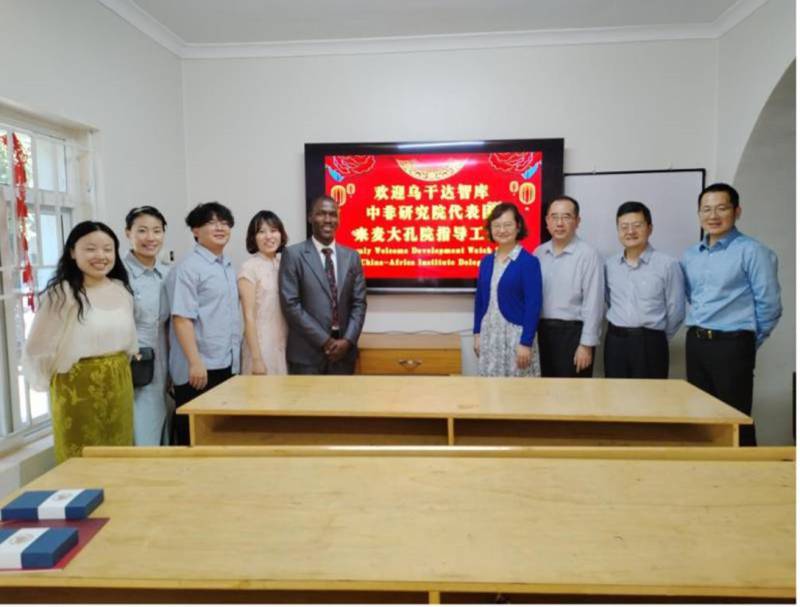
The CAI delegation members and Chinese teachers of the Confucius Institute at Makerere University
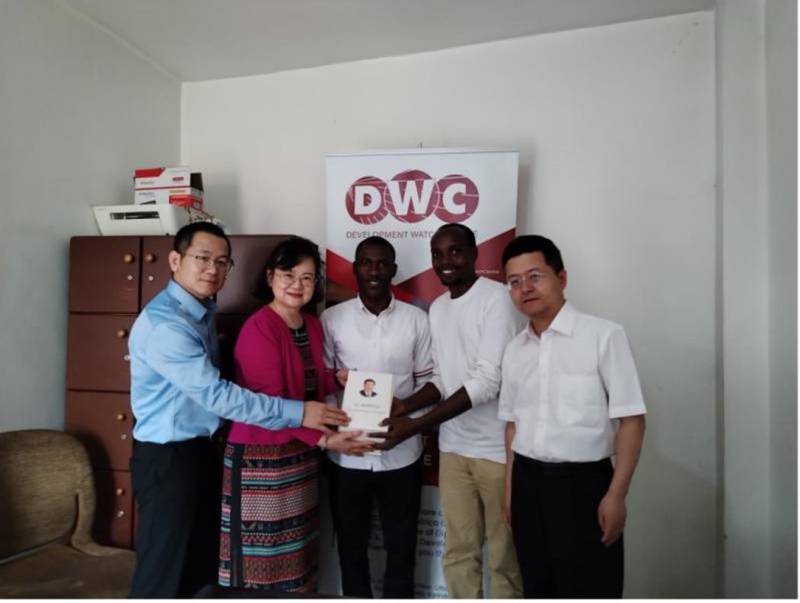
The CAI delegation is presenting the English version of Xi Jinping: The Governance of China as a gift to DWC
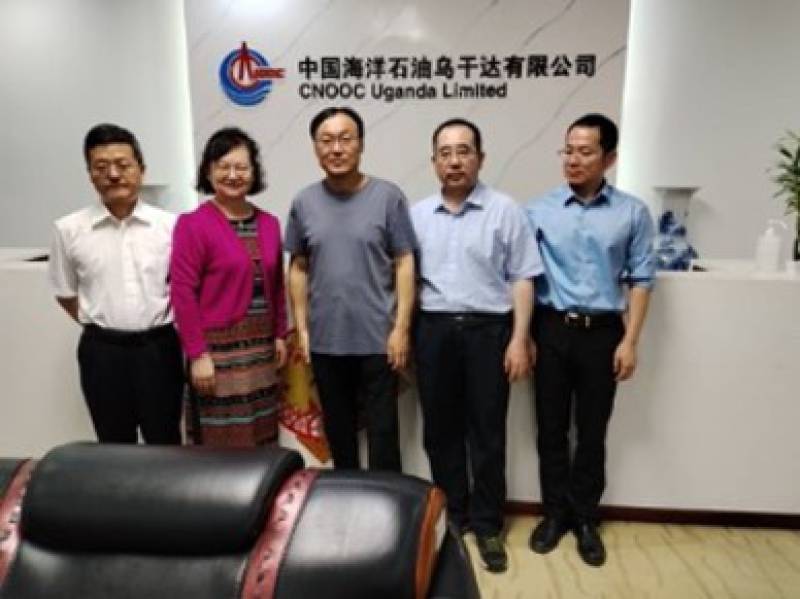
The CAI delegation and Wang Jufeng, vice president of CNOOC, Uganda Limited
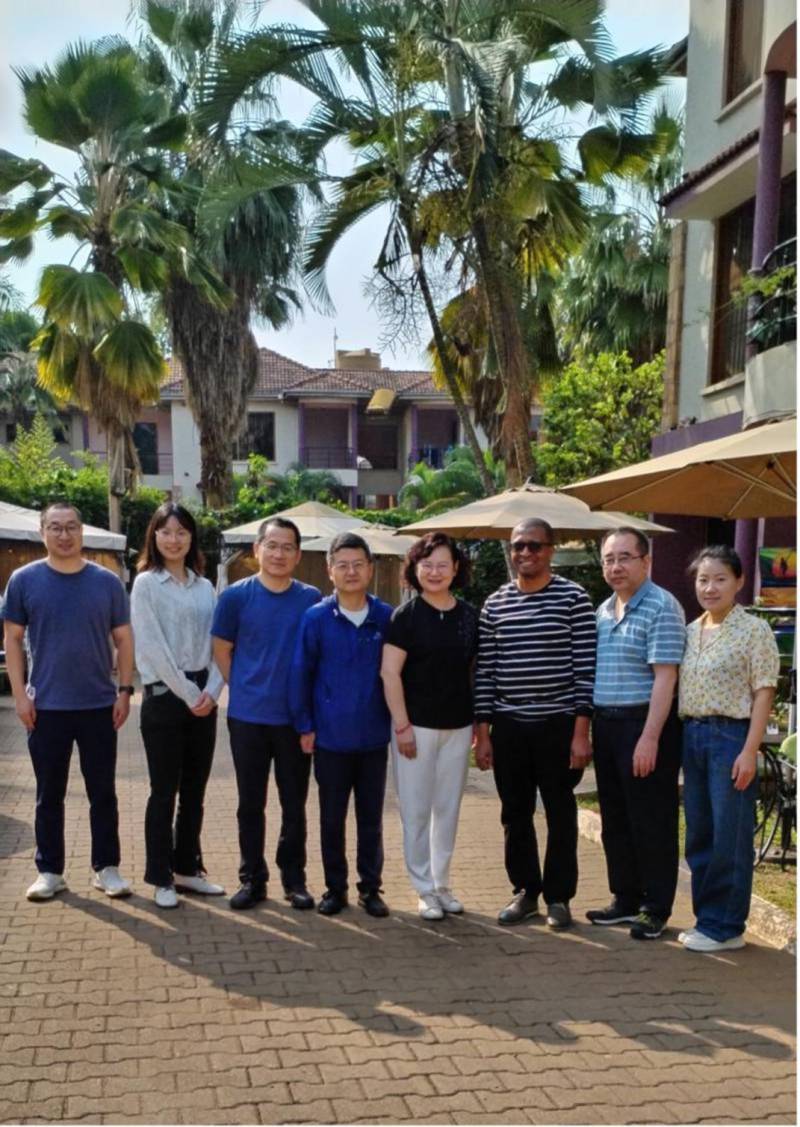
Group photo (The 3rd right: Abudulaziz, officer of the NCDC)
The CAI delegation’s academic exchange in Uganda came to a successful conclusion. The delegation members were impressed by the Ugandans’ fervent wish to strengthen cooperation with China in a wide range of fields, especially in education, investment, healthcare, poverty alleviation and infrastructure development. This experience provides valuable reference for the CAI to host China Lecture in Africa in the future and further reinforce its role as a national think tank.


